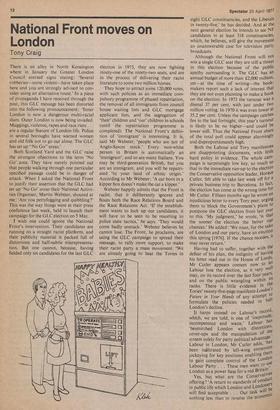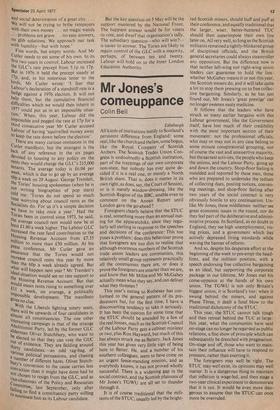National Front moves on London
Tony Craig
There is an alley in North Kensington where in January the Greater London Council erected signs stating: 'Several robberies—some violent—have taken place here and you are strongly advised to consider using an alternative route.' In a piece of propaganda 1 have received through the post, this GLC message has been distorted into the following pronouncement: 'Inner London is now a dangerous multi-racial slum. Outer London is now being invaded. Muggings, violence, rapes and race riots. are a regular feature of London life. Police in several boroughs have warned women and old folk not to go out alone. The GLC has set up "No Go" areas.'
Both Scotland Yard and the GLC raise the strongest objections to the term 'No Go' area. They have merely pointed out that people walking through one particular specified passage could be in danger of attack. When I asked the National Front to justify their assertion that the GLC had set up 'No Go' areas their National Activities Organiser, Martin Webster, shouted at me: 'Are you pettyfogging and quibbling?' This was the way things were at their press conference last week, held to launch their campaign for the GLC election on 5 May.
wish one could ignore the National Front's intervention. Their candidates are running on a straight racist platform, and their publicity material is packed full of distortions and half-subtle misrepresentation. But one cannot, because, having fielded only six candidates for the last GLC election in 1973, they are now fighting ninety-one of the ninety-two seats, and are in the process of delivering their racist literature to some two million homes.
They hope to attract some 120,000 votes, with such policies as an immediate compulsory programme of phased repatriation, the removal of all immigrants from council house waiting lists and GLC mortgage applicant lists, and the segregation of 'their' children and `our' children in schools (until the repatriation programme is completed). The National Front's definition of 'immigrant' is interesting. It is, said Mr Webster, `people who are not of Anglo-Saxon stock.' Every non-white person in Britain is automatically an `immigrant', and so are many Italians. You may be third-generation British, but you are an immigrant, and you will be repatriated `to your land of ethnic origin.' According to Mr Webster; 'A cat born in a kipper box doesn't make the cat a kipper.'
Webster happily admits that the Front is racist, that it deliberately ignores and flouts both the Race Relations Board and the Race Relations Act. 'If the establishment wants to lock up our candidates, it will have to be seen to be resorting to police state tactics,' he says. 'They would come badly unstuck.' Webster believes he cannot lose. The Front, he proclaims, are using the GLC campaign to spread their message, to rally more support, to make their racist party a mass movement. 'We are already going to beat the Tories in
Spectator 23 April 1977 eight GLC constituencies, and the Liberals
in twenty-five,' he has decided. And at the next general election he intends to see NF candidates in at least 318 constituencies, which, he believes, will give the movement an unanswerable case for television party. broadcasts.
Although the National Front will not win a single GLC seat they are still a threat in this election because of the public apathy surrounding it. The GLC has an annual budget of more than £2,000 yet—at the time of writing—the bookmakers report such a lack of interest that they are not even planning to make a book on the election. In 1973 the turnout was a dismal 37 per cent, with just under two million voting. In 1970 it was even lower at 35.2 per cent. Unless the campaign catches fire in the last fortnight, this year's turnout is likely to be no higher—and could be lower still. Thus the National Front share of the total poll could appear alarminglY and disproportionately high.
Both the Labour and Tory manifestoes are disappointing documents, with little hard policy in evidence. The whole campaign is surprisingly low key, so much so that in the immediate run-up to the election the Conservative opposition leader, Horace Cutler, felt able to take last week off for 3 private business trip to Barcelona. In fact, the election has come at the wrong time for Mr Cutler. Fifteen months ago he wrote an injudicious letter to every Tory peer, urging them to block the Government's plans to postpone the GLC election from last year to this. 'My judgment,' he wrote, `is that the sooner the election the better our chances.' He added: 'We must, for the sake of London and our party, have an electio.n this spring [1976]. If the chance recedes, it may never return.' Having had to suffer, together with the defeat of his plan, the indignity of having his letter read out in the House of Lords, Mr Cutler appears content now to let Labour lose the election, as it very well may, on its record over the last four years, and on the public wrangling within its ranks. There is little evidence in tile Tories' twenty-five-page manifesto London s Future in Your Hands of any attempt to formulate the policies needed to halt London's decline.
which, wear
s instead, told is ios onnLeaboofur's reco rd, ‘iil incompetence and waste.' Labour 'besmirched 'besmirched London with distortions, cover-ups and the manipulation of tile, system solely for party political advantage. Labour in London, Mr Cutler adds, h. as been infiltrated by left-wing extremists . jockeying for key positions enabling 111°1 to gain complete control of the Londone Labour Party . . . These men want .to. London as a power base for a red. Britain. . Yes, but\ what are the Conservatives offering? `A return to standards of con U. in public life which London and Londoner will find acceptable . . . Our task will nothing less than to reverse the econorrw
and social deterioration of a great city. . . We will not be trying to bribe ratepayers With their own money . . . no magic wands • • . problems are grave ... no easy answers, no glib solutions. We approach our task with humility—but with hope.'
Fine words, but empty words. And Mr
Cutler needs to eat some of his own. In its first two years in control, Labour increased the GLC's rate precept from 5.1p to 17p. But in 1976 it held the precept steady at 17P, and, in his notorious letter to the lords, Mr Cutler wrote: 'I fear that Labour's declaration of a standstill rate is a hedge against a 1976 election. It will not help them, but the cumulative financial
difficulties which we would then inherit in
1977 could put us in an impossible situation.' When, this year, Labour did the impossible and pegged the rate at 17p for a third consecutive year Mr Cutler accused Labour of having 'squirrelled money away to keep the rate down before the election'.
There are many curious omissions in the
Cutler manifesto, but the strangest is the lack of any reference in the six pages devoted to housing to any policy on the rents they would charge the GLC's 215,000 tenants. The average today is £6.04 per week, which is due to go up by an average 60P a week on 29 August. George Tremlett, the Tories' housing spokesman (when he is not writing biographies of pop stars) told me: 'Tories do not spend so much time worrying about council rents. as the Socialists do. For us it's a simple decision We have to take once a year.' Had the Tories been in control since 1973, he said, the average council rent would now be at least £1.80 a week higher. The Labour GLC increased the rate fund contribution to the Housing Revenue Account from £7.35 million to more than £50 million. At his Press conference, Mr Cutler gave an assurance that the Tories would not Increase council rents this year by more than the 60p a week already agreed. But ‘v. hat will happen next year? Mr Tremlett's Ideal situation would see no rate support to the Housing Revenue Account. But that W, °old mean rents rising to something over ..11 a week, on average, a politically lin, Possible development. The manifesto gives no clue.
With the Liberals fighting ninety seats,
there will be upwards of four candidates in almost all constituencies. The one other Interesting campaign is that of the strange Abolitionist Party, led by the former GLC a. derman Oliver Stutchbury, who want to be elected so that they can vote the GLC .°,dt of existence. They are fielding around candidates.—an odd rag-bag, of various political persuasions, and chasing a number of different hares. Oliver Stutch ourys conversion to the cause carries less conviction than it might have done had he not chosen to resign from the GLC, and as v Committee of the Policy and Resources 0. Mmittee, last September, only after lading to find a constituency party willing to nominate him as its Labour candidate.
But the key question on 5 May will be the support mustered by the National Front. The happiest answer would be for voters to vote, and dwarf that organisation's tally. The subsidiary question-who will win ?— is easier to answer. The Tories are likely to regain control of the GLC with a majority, perhaps, of between ten and twenty. Labour will hold on to the Inner London Education Authority.



































 Previous page
Previous page